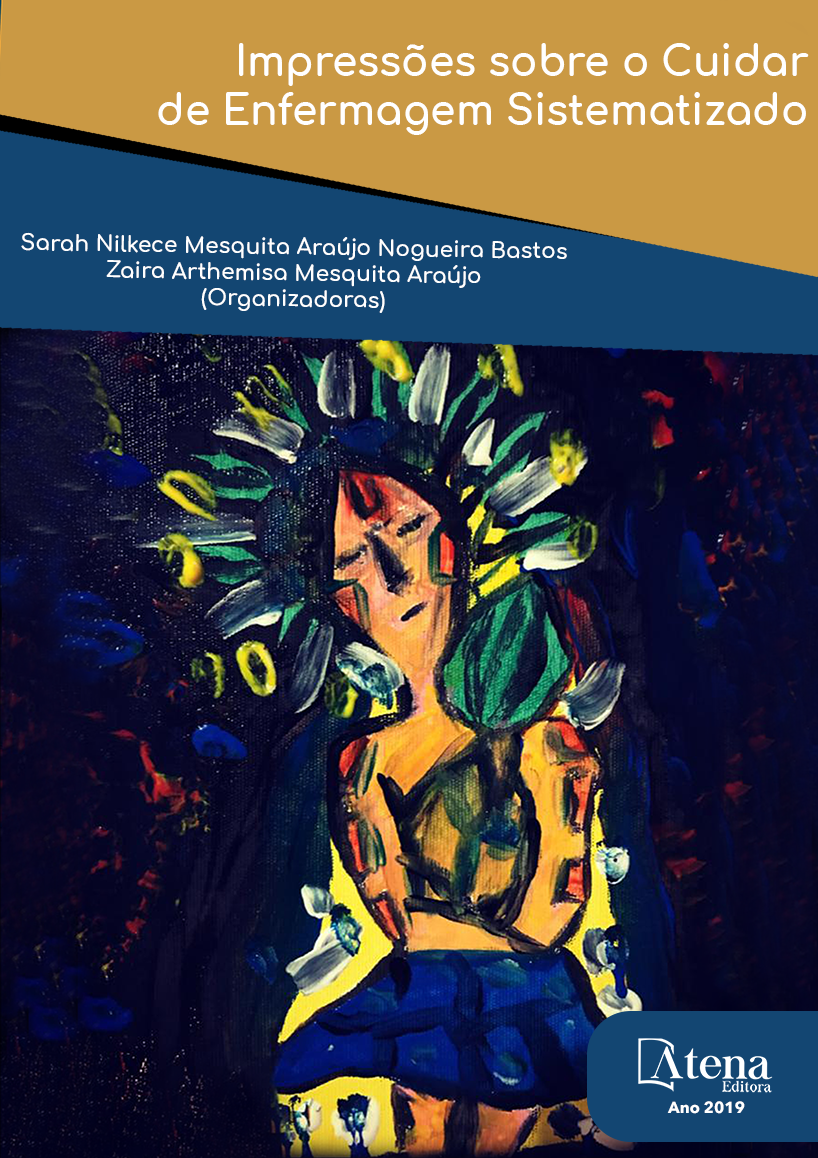
TEORIA DOS VINTE E UM PROBLEMAS DE ENFERMAGEM DE FAYE ABDELLAH E O PROCESSO DE ENFERMAGEM NA SÍNDROME DE FOURNIER: RELATO DE EXPERIÊNCIA
Objetivou-se relatar a vivência de
acadêmicos de enfermagem na assistência
ao paciente com Síndrome de Fournier pela
aplicação do Processo de Enfermagem,
conduzido pelo referencial teórico dos vinte
e um problemas de enfermagem de Faye
Abdellah, adotando as distintas classificações
taxonômicas NANDA, NIC, NOC e CIPE.
Trata-se de um estudo qualitativo do tipo
relato de experiência do uso das taxonomias
North American Nursing Diagnosis Association
(NANDA-I), Nursing Intervention Classification
(NIC), Nursing Outcomes Classifications (NOC)
e Classificação Internacional para a Prática de
Enfermagem (CIPE), associadas à Síndrome
de Fournier. O estudo foi realizado em outubro
de 2018 em um Hospital da rede pública do
Piauí, orientado pela Teoria dos Vinte e Um
Problemas de Enfermagem desenvolvida
por Faye Abdellah, inserido na disciplina de
Metodologia da Assistência de Enfermagem de
uma Instituição de Ensino Superior pública no
Piauí. O processo de enfermagem aconteceu
mediante as 5 etapas com base na Resolução
358/2009 do Conselho Federal de Enfermagem
(COFEN). A coleta seguiu o Anexo A do
modelo de Alba Lúcia aliado ao roteiro para a
evolução de enfermagem da Sistematização da
Assistência de Enfermagem (SAE) padronizado
pelo serviço, e após análise foram determinados
4 diagnósticos, intervenções e resultados nas
distintas taxonomias. A aplicação de taxonomias
para a projeção dos cuidados de enfermagem
a serem desempenhados na assistência ao
paciente possibilita um aprendizado multinível.
A realização do estudo submetido aos preceitos
de uma teoria de Enfermagem remete a
importância de utilizar uma base norteadora para
que a aplicação do processo de enfermagem
mantenha-se orientada.
TEORIA DOS VINTE E UM PROBLEMAS DE ENFERMAGEM DE FAYE ABDELLAH E O PROCESSO DE ENFERMAGEM NA SÍNDROME DE FOURNIER: RELATO DE EXPERIÊNCIA
-
DOI: 10.22533/at.ed.3001916096
-
Palavras-chave: NANDA-I. Processo de Enfermagem. Cuidados de Enfermagem. Gangrena de Fournier. Teoria de Enfermagem.
-
Keywords: NANDA-I. Nursing Process. Nursing care. Gangrene of Fournier. Nursing Theory.
-
Abstract:
To report the experience of nursing scholars in the care of the patient
with Fournier’s Syndrome by applying the Nursing Process, guided by the theoretical
reference of the twenty-one nursing problems of Faye Abdellah, adopting the different
taxonomic classifications NANDA, NIC, NOC and CIPE. This is a qualitative study
of the type report of experience of the use of taxonomies North American Nursing
Diagnosis Association (NANDA-I), Nursing Intervention Classification (NIC), Nursing
Outcomes Classifications (NOC) and International Classification for Nursing Practice
(CIPE), associated with the Fournier Syndrome. The trial was performed in October
2018 at a public hospital in Piauí, guided by The Theory of Twenty-One Problems
of Nursing developed by Faye Abdellah, inserted in the discipline of Nursing Care
Methodology of a Public Institution of Higher Education in Piauí. The nursing process
was carried out through the 5 steps based on Resolution 358/2009 of the Federal
Nursing Council (COFEN), with the collect directed by Annex A of the model Alba
Lúcia Allied to the Road Map for the Evolution of Nursing in the Systematization of
Nursing Care (SAE) standardized by the service, and after analysis 4 diagnoses were
determined, interventions and results in the different taxonomies. The application of
taxonomies to the projection of nursing care to be performed in patient care enables
multilevel learning. The accomplishment of the study submitted to the precepts of a
Nursing theory reveals how important it is to use a guiding base of knowledge for the
application of the nursing process to be oriented.
-
Número de páginas: 15
- João Matheus Ferreira Do Nascimento
- Ivanildo Gonçalves Costa Júnior
- Jonathas Torquato de Oliveira
- Luis Augusto Damasceno Batista
- Denival Nascimento Vieira Júnior
- Sarah Nilkece Mesquita Araújo Nogueira Bastos
- Bruno


